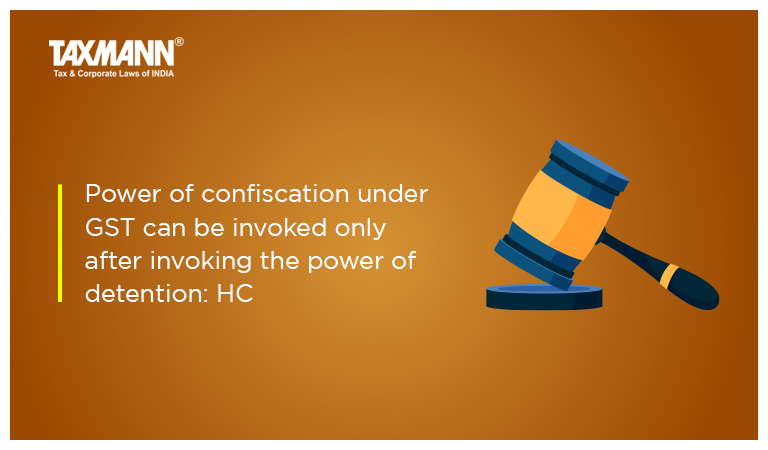Power of confiscation under GST can be invoked only after invoking the power of detention: HC
- Blog|News|GST & Customs|
- 2 Min Read
- By Taxmann
- |
- Last Updated on 23 September, 2022

Case Details: Rajeev Traders v. Union of India - [2022] 142 taxmann.com 420 (Karnataka)
Judiciary and Counsel Details
-
- N.S. Sanjay Gowda, J.
- Venkatesh Kumar. S, Adv. for the Petitioner.
- M.B. Kanavi & G.S. Hulmani, Advs. for the Respondent.
Facts of the Case
The goods and vehicle of petitioner were detained on the ground that E-way bill was not generated. However, the goods were accompanied by tax invoice which indicated payment of tax. The proper officer didn’t issue notice demanding tax and penalty but directly initiated confiscation proceedings.
The petitioner filed writ petition against the confiscation proceedings and contended that the proper officer was required to issue a notice specifying the tax and penalty payable and thereafter pass the order for payment of tax and penalty. If the amount would not be paid then the confiscation proceedings to be initiated by the officer.
The Proper Officer submitted that on noticing the intent to evade payment of tax, he decided to invoke his power under Section 130 of CGST Act, 2017 and confiscate the goods and conveyances.
High Court Held
The Honorable High Court observed that as per Section 129, the proper officer shall be bound to release goods and conveyances if penalty prescribed and applicable tax under Section 129 was paid. However, the power of confiscation of detained goods and conveyances shall be available only if applicable tax and penalty was not paid within 14 days despite order being passed in that regard.
Thus, the Court held that the entire procedure adopted by proper officer for converting detention proceedings into confiscatory proceeding, which ultimately led to order of confiscation, was wholly illegal.
Disclaimer: The content/information published on the website is only for general information of the user and shall not be construed as legal advice. While the Taxmann has exercised reasonable efforts to ensure the veracity of information/content published, Taxmann shall be under no liability in any manner whatsoever for incorrect information, if any.

Taxmann Publications has a dedicated in-house Research & Editorial Team. This team consists of a team of Chartered Accountants, Company Secretaries, and Lawyers. This team works under the guidance and supervision of editor-in-chief Mr Rakesh Bhargava.
The Research and Editorial Team is responsible for developing reliable and accurate content for the readers. The team follows the six-sigma approach to achieve the benchmark of zero error in its publications and research platforms. The team ensures that the following publication guidelines are thoroughly followed while developing the content:
- The statutory material is obtained only from the authorized and reliable sources
- All the latest developments in the judicial and legislative fields are covered
- Prepare the analytical write-ups on current, controversial, and important issues to help the readers to understand the concept and its implications
- Every content published by Taxmann is complete, accurate and lucid
- All evidence-based statements are supported with proper reference to Section, Circular No., Notification No. or citations
- The golden rules of grammar, style and consistency are thoroughly followed
- Font and size that’s easy to read and remain consistent across all imprint and digital publications are applied



 CA | CS | CMA
CA | CS | CMA
